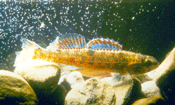Watercress darter
The watercress darter (Etheostoma nuchale) is a small, reddish fish with colorful fins which lives in the Black Warrior River drainage basin near Birmingham. To date it has only been found in a few locations in streams in Powderly, Roebuck Springs, and Thomas Spring and Glenn Springs in Bessemer, plus a reserve population planted in Pinson. Originally these populations would have been connected, but today the waterways that link them are either too polluted or altered for the populations to mingle.
The species is named for its preferred habitat in the "watercress zone" of springs. It feeds on snails, crustaceans and insect larvae. The largest known female was 2.5 inches in length, but the fish are generally 1 to 1.8 inches long. Green sunfish, bluegills, and sculpins are known to prey on watercress darters.
The species is endangered and is protected by Federal and state laws. Protected habitats such as the Watercress Darter National Wildlife Refuge and Seven Springs Ecoscape help to conserve the species.
History
The watercress darter was discovered in 1964 by Mike Howell and R. D. Caldwell in Glenn Springs, a tributary of Halls Creek, in Bessemer. Another population was not found until 1976, when a second was found in Thomas Spring, another tributary of Halls Creek in Bessemer. In 1980, Watercress Darter National Wildlife Refuge was established around Thomas Spring exclusively to protect the rare fish.
In the 1980s the fish was also discovered in the small stream that runs in front of the Hawkins Recreation Center, and in a small pond just south of the Alabama Department of Youth Services Vacca Campus. Darters have also been found in the stream below the dam as it winds through the Roebuck Municipal Golf Course and flows into Village Creek. As a result, the Birmingham Park and Recreation Board agreed to stop using pesticides near the edge of the stream, which increased its fish population, including the watercress darter.
In 1986 a reserve population of darters was planted at Penny Springs in Pinson by Howell, leading a "recovery team" sponsored by the U.S. Fish and Wildlife Service.
In the early 2000s, the fish was also found in a spring that flows in front of Faith Apostolic Church in Powderly by Samford University professors Mike Howell and Larry Davenport. Seven Springs Ecoscape, a park designed to protect the darter, opened adjacent to the church on April 13, 2008.
Roebuck fish kill
In September 2008 the earthen dam at Roebuck-Hawkins Park was demolished by order of the park director, Regina Nummy. She claims to have not known about the pond's importance to the endangered species and to have been responding only to damage caused by flooding of the park's tennis courts, located just above the dam. 11,760 individual fish were killed, in part because their instinct when surprised by moving water is to seek shelter in the grasses at the pond's edge rather than to swim with the current. Federal and state wildlife officials collected specimens, developed a pond restoration plan, and began an investigation which may lead to criminal charges. Mayor Larry Langford requested that Balch and Bingham represent the city in defending itself against possible action.
Under the restoration plan another temporary sandbag dam was built, bringing the pond depth back to about 12 inches. An aerator was used to restore oxygen levels and teams of biologists and volunteers frequently monitor water quality and keep an eye on the fish population. A non-native crayfish population that had been preying on the fish was also eradicated. The temporary dam was later replaced with a tamper-proof dam specially designed for the pond. By June 2009 scientists from the University of Alabama found about half as many individual fish in the pond as in previous years.
References
- Howell, W. M. and R. D. Caldwell (October 11, 1965) "Etheostoma (Oligocephalus) nachale, a new darter from a limestone spring in Alabama." Tulane Studies in Zoology. vol. 12, no. 4. pp. 101-108
- "Etheostoma nuchale". FishBase. Ed. Ranier Froese and Daniel Pauly. March 2006 version. N.p.: FishBase, 2006.
- Bryant, Walter (March 6, 2007) "Birds, watchers flock to Roebuck." Birmingham News.
- Tran, Linh and Ingrid Pfau. (2008). "Saved: The Story of the Watercress Darter." Digital City Films.
- Spencer, Thomas (April 14, 2008) "Rare fish a symbol of Christian conservation." Birmingham News.
- Bouma, Katherine (September 23, 2008) "Dam removal kills more than 1,000 endangered fish at Roebuck Springs." Birmingham News
- Wilson, Glynn (September 23, 2008) "At Least 1,000 Endangered Watercress Darters Killed" The Locust Fork Journal
- Watercress darter. (March 20, 2006) [1] Wikipedia, The Free Encyclopedia. Accessed September 23, 2008.
- Bouma, Katherine (September 26, 2008) "Professor reveals darter reserve." Birmingham News
- "Watercress Darter National Wildlife" (n.d.). U. S. Fish & Wildlife Service. Accessed September 26, 2008
- Bouma, Katherine (December 27, 2008) "Roebuck Springs watercress darters monitored after pond-draining disaster." Birmingham News
- Bouma, Katherine (June 9, 2009) "Endangered darters struggling to rebound." Birmingham News
External links
- Watercress Darter at Outdoor Alabama
